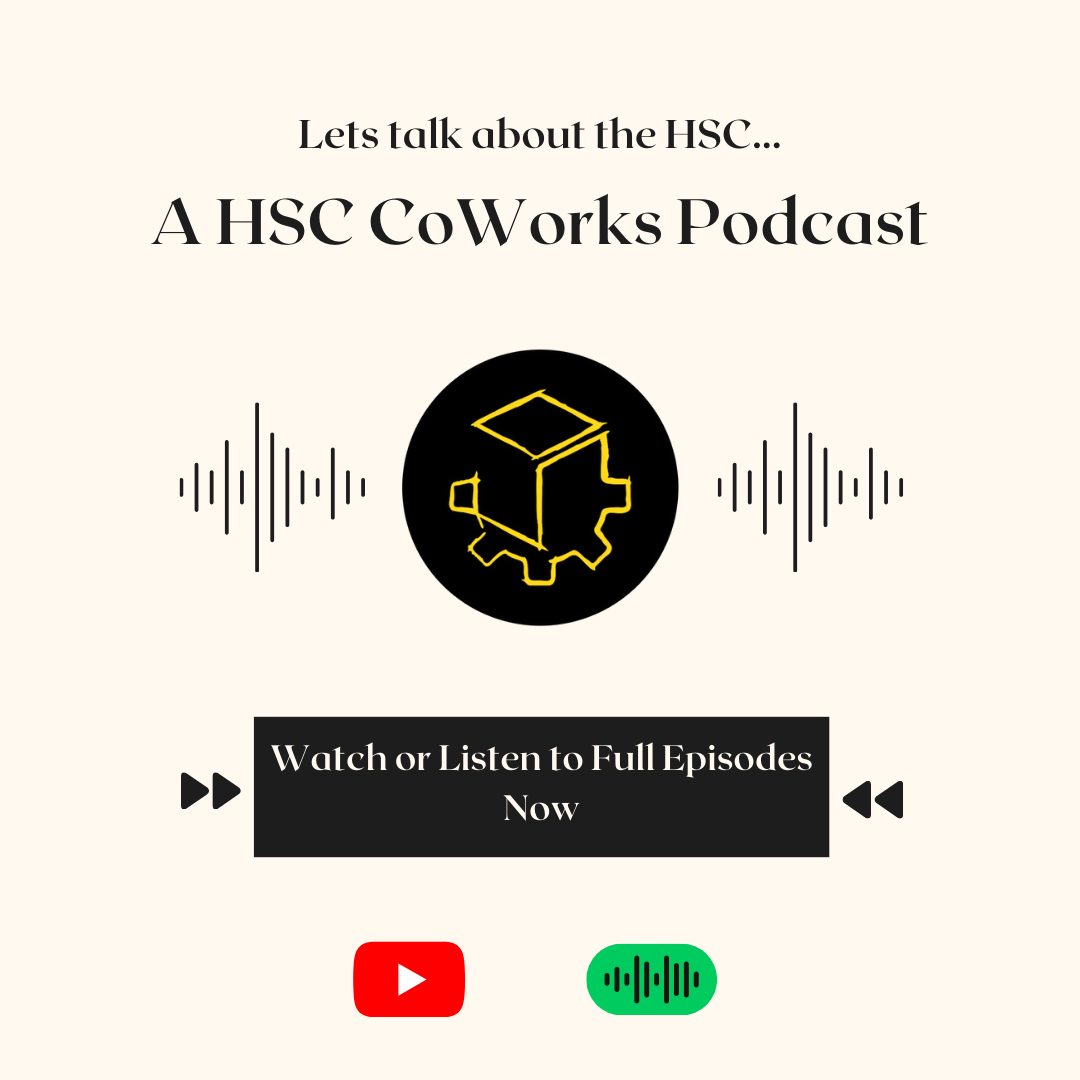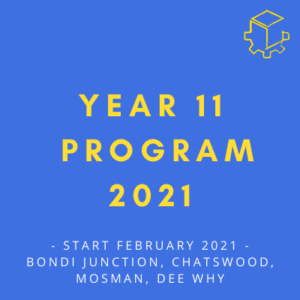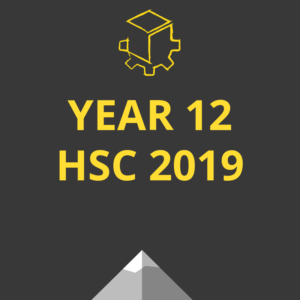Major works are like wheat. Yep you read that right. Wheat. And I know what you are thinking right now “major works are nothing like wheat!?”. But let me explain. Wheat is a very important crop, which sustains many people and is harvested at the end of summer. But. It is planted at the end of winter. Over the next half year it is carefully cultivated and every effort is made to ensure the harvest is plentiful. But what would happen if the farmer got lazy and decided to ‘cram’ everything into the last month? Well quite simply there would be no harvest. No matter how hard he worked he could never compete with the farmers who sowed in winter. He would become increasingly stressed and demotivated while the others would leisurely be making their final preparations for a satisfying harvest.
I’m sure you understand the analogy. And if not, it might be a good English comprehension exercise (3 mark question: How is the analogy used to articulate various ideas about discovery?)
HSC CoWorks Senior Coach, Michaela Turancova shares her incredible journey and major work tips below.
My Story..
Two years ago (wow time flies) I was exactly in your position. I had just started year 12 and summer holidays were quickly approaching. We had finished our first lot of assessments and my Visual Arts teacher was driving everyone mad with her constant criticisms of our ideas. My textile and design teacher on the other hand was completely relaxed and didn’t seem to care what we did during our classes. Having experienced both ends of the spectrum I can confidently say that both approaches had their benefits but also many downsides.
Coming up to the break I had my Art idea mainly finalised. The concept was cemented in my mind and I was starting to experiment with various materials. My VA major work turned out to be a lifesize wire and metal shark. But originally I was thinking about using car tyres. That didn’t work. So I changed materials, started working with something I was more familiar with. BUT the concept stayed the same (and of course developed throughout the year).
I strongly recommend that this is the position you are in at the beginning of the holidays. Its ok for you to change your materials and style etc. but it is very important that you clarify your concept as much as possible before the end of this year. You need to be passionate about what you are conveying. It’s a message, a feeling, you can’t say in words. A famous painter (do you know who?) once said “If I could say it in words, there would be no reason to paint”. That is how you should feel about what you are creating. If you have passion you will have the motivation and drive to finish your work and make it perfect. Believe me, the passion of the artist IS seen through a work, and obviously it is important to the markers.
When holidays started I spent the first few days relaxing and then started collecting materials for my sculpture. I visited garbage dumps, scrap metal places and old car shops looking for things I could use in my work. Handy tip: if you tell people you are looking for materials for a major work and are nice and polite most will be more than happy to give you materials for free or at a heavy discount!!
The next few days I focused on textiles. I have always had a vision of the dress I wanted to create for my major work. I still had to go through the process of researching and drawing etc and it was helpful in developing my idea further. Even though textiles does not have a concept this means that your innovation, construction expertise and number of techniques used must be extraordinary. So even if you think you have an idea in mind don’t complain about all the preliminary planning stages. Are you familiar with the saying: measure twice, cut once? It is very important you get everything planned out, you only get one shot at the major work.
At the same time this whole planning process is an important part of your portfolio (which has the same weighting as the major work) so I’d recommend you do your portfolio as you go along. I have friends who are very meticulous about their work and were planning to decorate the portfolio but because they left it to the last minute they just ended up gluing paper in and handed it in completely plain.
Luckily for me, my grandmother used to be a seamstress, and once I finalised my idea we called her and gave her my measurements so she could draft my pattern. Note: your pattern can be outsourced as long as you acknowledge this in your portfolio! If you know how to make your own patterns (I’m going to visit my grandma to learn these holidays, yay!!) then even better. There’s another technique for you J Once the pattern arrived I made a mockup out of calico (this was still during school time though!) and made adjustments to the pattern. Hint: A mockup is definitely necessary, especially is you have a complex design! After my fabric arrived I started making the actual dress!! I made the corset first and then handpainted it. My family won’t ever let me forget that experience! I got everyone to sit around a table and stretch out the corset for me while I painted. AND this was all on Christmas Day!! Some sacrifices are worth making though! Useful tip: If you are using silk fabric, google around and order online. I got mine from Thailand and it ended up being about 30% of the price I would have paid in Australia. Also a silk/poly blend is cheaper and generally looks the same J
After I had done this, it was time to do a bit of art again and I got my dad to help me bend stainless steel rods for the armature of the sculpture. Again its ok to get help, especially with something you cannot physically do, as long as it is your design and directions they are working from. Once this was done I waited until school to weld it all together and meanwhile went back to experimenting. Once I found a few techniques I liked and knew where I wanted to use them I started working on them.
Once school goes back you will have half yearlies, then trials. Those exams are hard. You need to study. You can’t study if you are working on your major work all the time. If that’s the case, you will have to make a decision. Either the major work or do well in exams. It doesn’t work both ways, unfortunately.
From the discussions I have had with the CoWorks Mosman group, I can say you are on the right track! Keep working hard, keep sowing the seeds so later you can reap all the success (If you do well, these subjects scale very nicely). You’ve never done a work like this before, I can guarantee it is not like other ‘knowledge’ subjects where you might get away with cramming. Here you must be prepared well in advance. As for the CoWorks Bondi cohort, I hope there are many major works in progress this side of the bridge too! I look forward to hearing about your progress and if you have any questions please don’t hesitate to message me on basecamp or send me an email.
In an ideal world what I would like you to have done by the end of the holidays:
- If you don’t have your idea/concept finalised, get this done ASAP!!
- Get all your materials (paints, canvases, scrap metal, fabrics, wood etc)
- DO EXPERIMENTATION!!! I cannot stress enough how important it is you try out different things to see what suits you and your work the best
- START
- This might be doing one or more canvases in a multi piece work, making the sculpture construction, cutting out the pattern, filming footage or making prototypes for DT
- THIS IS IMPORTANT!!! I want to see everyone majorly stuck into their prac work when I return in March.
Tips:
- Don’t get too tied up in what teachers say. Be flexible but also know what you want.
- My textiles teachers always tried to stop me from doing things I wanted to do, but I persevered, and look I ended up topping the state!
- My VA teacher on the other hand always pushed me to do more, to change this, alter that. I compromised on a few things (which admittedly helped a lot) but stuck with my original idea and again I ended up coming 4th in state!
- If you do a subject requiring a portfolio, ASK FOR A SAMPLE ONE!! Your teacher will probably have one, all the major work displays have them. If you are really stuck I can show you how I did my textile one
- Realise how much your major work is worth. Surprise: it is not 50% of your mark!
- VA 25% (50% is school assessments, the other 50% is divided equally between the final exam and major work)
- Textiles and DT – 5% (same mark breakdown as for VA, except major work is again divided equally between portfolio and actual prac work)
- This means you really need to stay on top of your theory work and portfolio!
- Portfolio: to avoid unnecessary decoration etc. use the program Adobe Indesign (set A3 pages) and design it all, including decorations digitally so all you have to do later on is print it. It also helps with squishing in everything into the small page limit.
- Be aware of the page limit for your portfolio and any restrictions on font size, spacing etc. You do not want to lose any marks for having too much writing!
- Try calculating how long you think your major work/s will take
- My VA: 500+ hours
- My textiles: 250 hours (including folio)
- Make a plan for what you want to get done and stick to it!!
- Planning your textiles work will ensure that your techniques are tastefully integrated into the work instead of just hurriedly being ‘slapped on’ anywhere, which frankly, looks quite bad.
- Get your parents as involved as possible. Get them to remind you to keep working. Even though you will hate the constant reminders/questions it is very very helpful!
- Realise that you will, never again, get such a large amount of time with so little other things to do. Use it wisely. Sow your seeds now so you can reap later.
- Be friendly with your teachers. Even though they can be harsh (god knows how many times my VA teacher made me cry) they do mean the best and their suggestions will get you extra marks
- ART: be aware of any restrictions. E.g. no glass, no sharp edges, max 1 cubic meter, max 16 sq m for painting/drawing, max 6 mins for just film etc.
- Probably don’t start working with a brand new medium/style. Do what you know you are good at J
- ENJOY your major work! It will be the one subject where you don’t work with your mind, but your hands. Take this as your downtime instead of watching TV or being on Facebook.
These tips are specific for hands on major works, however, the same basic principles apply to things like Eng ext 2 and hist ext. Work now, get as much done as possible and life will be a lot simpler for you later on!
My major works (incase you need some inspiration or motivation). It is hard but it can be done! Keep working, at the moment you all have equal potential to state rank.












